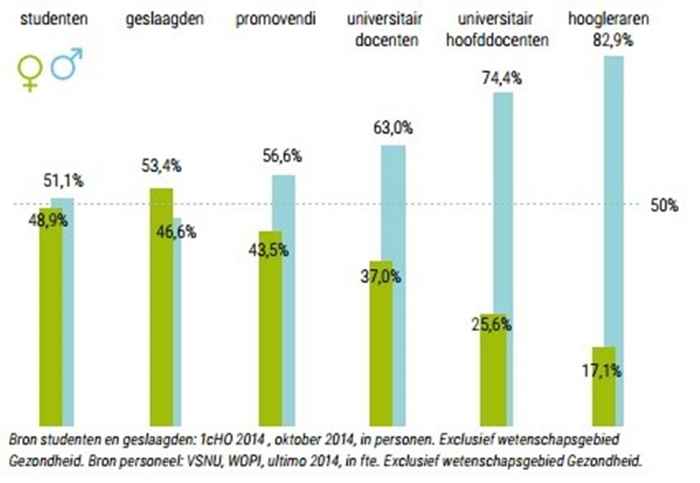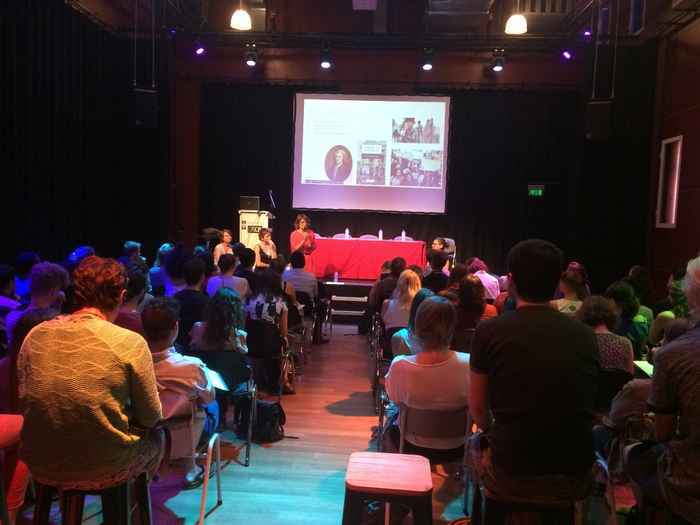ARC-GS Lecture series: Gender mainstreaming in academia
By Anne Louise Schotel
A leaky pipeline
Each day, when I visit my university in Utrecht and push against the heavy front door of my faculty building, I step across a threshold above which an old sign reads: “Physics Laboratory”. The sign stems from the 1870s, when the first women were allowed access to the universities in the Netherlands. It would have been a rare sight to see so many young women like me in the building, now part of the social sciences.
We have come a long way since 1870. Today 53.4%* of graduates from universities in the Netherlands is female. Despite ongoing feminist efforts to improve gender equality, institutionalisation is a slow process. The numerical growth of female students notwithstanding, gender biases, a gender pay gap and sexism persist. A striking feature of the gender gap is often described as the ‘leaky pipeline’. As women progress in their academic careers, they drop out in vast percentages as they get higher up the ladder (as depicted in the graph below). On the graduate level women form a majority, but that rapidly changes after the completion of a PhD and onwards. In 2016 only 17.1% of full professors in the Netherlands are women.
* Source: Monitor Women Professors 2015 - LNVH

Closing the gap
So what can be done about this gender gap? Studies have shown that there are plenty of available female candidates for professorships (van den Brink & Benschop, 2010, Carrell et al, 2010). Thus, mainstreaming gender equality is the main challenge. How can we successfully mainstream gender in the practice of the academic world? What are the promises and the limits of institutional change?
At the opening lecture at the Amsterdam Research Centre for Gender and Sexuality (ARC-GS) Professor Fiona Mackay (Edinburgh University), Dr. Maxime Frost (Science PO) and Dr. Liza Mügge (University of Amsterdam) investigated these questions. Professor Mackay states the formal rules in academia have changed, as women are now free to enter physics laboratories as they please. Yet, changing the formal rules does not necessarily mean that the informal rules and practices that make up the daily logic in academia change as well.
The challenge of gender mainstreaming lies in institutionalizing changes in these rules. From this perspective, Professor Mackay describes the dilemmas she deals with as a manager and a feminist academic. It is important that there are feminists in positions of power in order to make a difference in the environment that is created.

Tinkering at the edges
But there is feminist reluctance to take on leadership in the academy. Do we as feminist managers do the master’s bidding in a male dominated institution? Do we tinker at the edges and allow the regime to move forward unchanged? None of the speakers think so, but they emphasize the importance of being aware of the extent to which managers are taking part in colonizing practices. Forest even argues one should not do the master’s bidding but should speak his language in order to get the ‘Trojan horse of sustainable gender equality strategy’ in. Mügge is trying to do just that, by examining the curriculum in social sciences at the University of Amsterdam, where students mostly read the work of dead white men. She argues a gender perspective provides us with a critical lens and is therefore indispensable for all disciplines. As Joni Lovenduski said: “Good feminist social science is simply good social science”.
Being a leader in change is never fully innocent in the academy. So do feminists then vacate positions of power? Mackay answered this question by saying that the world is very messy, and change is difficult. It would be a shame if feminists did not occupy these spaces in order to try and slowly but steadily change some of the rules of the game.

Literature
Carrell, S. E., Page, M. E., & West, J. E. (2010) Sex and Science: How Professor Gender Perpetuates the Gender Gap. The Quarterly Journal of Economics, 125, 1101–1144.
Van den Brink, M, Y. Benschop, W. Jansen (2010) "Transparency in academic recruitment: a problematic tool for gender equality?" Organization Studies. 31(11) 1459-1483.